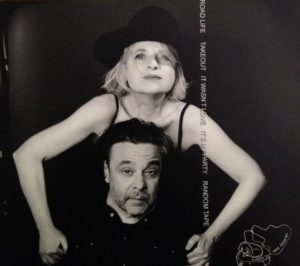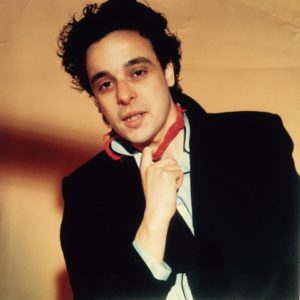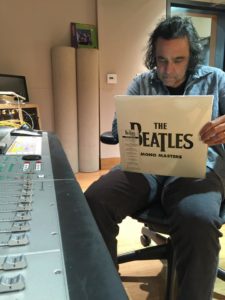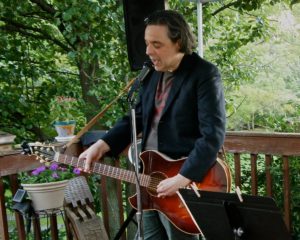Home Somewhere: Finding Jules Shear
On Friday night, June 20 of 2014, I saw a VSOP with possibly my favorite songwriter and recording artist, Jules Shear. This concert was a Jules Shear musical retrospective that was being filmed for an upcoming documentary about the career and life of Jules Shear. Chasing Jules is the project of filmmaker Andy LaValle who is also a longtime Jules Shear fan. (https://www.kickstarter.com/projects/andylavalle/chasing-jules). Andy’s story is one of falling in love with the music of Jules and the Polar Bears in the late 1970’s. Jules and the Polar Bears, fronted by singer/songwriter Jules Shear, were credited in being co-creators of the new, rough, urban sound of “Los Angeles Rock and Roll” polished up by Jackson Browne on his Hold Out record, or so said the review of Brown’s record. (http://www.rollingstone.com/music/albumreviews/hold-out-19800904). LaValle had followed Shear’s career but never seen him in concert until the Spring of 2013 when he attended a “living room concert” by Jules and his wife, Pal Shazar. Chasing Jules describes his long time search to find, see, and get to know this man whose music had meant so much to him over the years.
 I very much appreciate the sentiment and the effort, and am eager to see the film once it is complete, as it is almost two years past due. But the film I would make would be very different.
I very much appreciate the sentiment and the effort, and am eager to see the film once it is complete, as it is almost two years past due. But the film I would make would be very different.
I encountered Jules Shear for the first time on Sunday night, October 22, 1978 at Pittsburgh’s Stanley Theater where Jules and the Polar Bears were opening up for Peter Gabriel. The sound mix was rough for the first few minutes, but their energy was undeniable. Soon the clever lyrics and the infectious hooks had me enrapt. I felt like I was witnessing something special—like seeing the Kinks or The Who in 1965. Jules Shear was a Pittsburgh native, Squirrel Hill, to be exact, and the local FM stations played that first the Polar Bears record faithfully. “Playfully destructive” the radio ads said of the Got No Breeding LP. And it was all of that and more.
I remember buying Got No Breeding and playing it for the first time in the spring of 1979. I played it three straight times, both sides, eyes glued on the lyric sheet. Words and sounds that seemed to echo the jumble of thoughts and feelings in my 19-year-old-heart. I became a huge fan. I also became evangelical about Jules and the Polar Bears, quickly turning my friends on to their music. I didn’t create a movement, but did create a cadre of devoted Jules and the Polar Bears listeners.
I had been a music fan since I was young. But with adolescence came my first stereo and Q-format FM radio, creating a perfect sonic storm in the sturm und drang of my teenage years. It was cosmic synergy for someone who would simultaneously embrace the rock staples of the late 60s and the emerging sounds of the punk/new wave of the late 70s. The musical trinity of my high school years was comprised of Pete Townshend, Steve Winwood, and Todd Rundgren. But the new sounds of college inspired me to consider a new canon of the Clash, the Jam, Joe Jackson, and Gang of Four. Somehow Jules and the Polar Bears fit right in the middle of that musical mélange.
Their second record Phonetics (aka Fenêtîks) was a college radio staple my sophomore year. It was quirkier and leaned more heavily on the keyboards of Stephen Hague than Got No Breeding. But it was just as witty and biting. I was torn between hoping they would make it big and hoping they would remain critics’ darlings, the latter making them a band that would be like a private stock in the wine cellar of my record library.
In the summer of 1980, I went to Toronto to see The Who headline a day of music at the CNE Stadium, celebrating my 20th birthday with friends. Though the concert was certainly memorable, nearly as memorable was finding The Jules and the Polar Bears Economy Package, a four song EP of unreleased songs. Little did I know this would be the last vinyl record I would purchase by Jules and Polar Bears.
I cannot speak of anyone’s experience of transitioning from adolescence to adulthood beyond my own. I have, however watched my five children all enter their 20s and begin those awkward transitions into life after college. After college meant Theological Seminary for me. As an embryonic theologian, I had a canon of voices that helped me make sense of my world. Many of those voices were musical, and though not explicitly religious, were no less sacred to me. How much the words of a pre-Tommy Pete Townshend helped me understand my own life as a skinny, awkward kid with a big nose. As Townsend said, “Rock and roll names your problems and then helps you dance all over them, all in 2:30.” And though The Who of the arenas were aurally stimulating and adrenaline inducing, I missed much of their intimate insight into growing up from their Mod days. Jules Shear took up that place as I entered my twenties.
Though I would be remiss if I did not say that the Polar Bears were musically exquisite, and the songs and their arrangement were at times fun and occasionally profound, it was those unforgettable one-liners that stuck in my craw like a koan from a Zen master:

“The nice thing about true hopelessness is you don’t have to try again.”
“They say this is a marriage of convenience, but I have never known another kind.”
“You’ve got to make your mind your own to find your mind a match.”
“I love this city like a mischievous cat, ‘cause it troubles you enough to make you feel alive.”
“A weakness real enough to love; I know these jokes to well to laugh without a tear.”
And on I could go.
The lyrics of Jules Shear had become a part of the lens through which I saw my world.
And then the voice went silent.
I was in the basement of a college dorm waxing a floor, a graduate student’s summer job, when I heard on the radio that Joan Armatrading was coming to the Chicago area, “with special guest, Jules Shear.” I had three tickets, two friends, and one car lined up for the show by the end of the day. Jules was supporting his first solo album Watch Dog; Todd Rundgren produced, no less. I had to double clutch a bit, though, when listening to it. Everything about it was fine, but it was so different than the frenetic energy of the Polar Bears, instead harkening back a bit to his (then unknown to me) days in the Funky Kings, as well as expressing his fairly eclectic and broad embrace of pop/rock music. I heard Beach Boys, the Cars, and of course Rundgren. But I also began hearing Jules’ lyrics on the radio through the voice of Cyndi Lauper on her (their?) hit that summer “All Through the Night.”
So the time came to go see Jules. I was armed with enthusiasm, a Polar Bear patch (from early morning summer camp swims) I had saved to wear to the next Polar Bears concert, the record sleeve from Watch Dog with its large B&W photo of Jules, a note requesting an autograph, and a pen. It was a delight to see Jules Shear live again, and this time to know his music. He played nothing besides songs from Watch Dog and two unreleased new songs. I was giddy.
I was also nervous. I had placed my parcel containing my request for an autograph on the front of the stage. I had hoped he would see it, pick it up between songs, and then pass it back to me, as I was in the first rows. It became clear, however, that Jules did not see this fan’s overture and was coming perilously close to stepping on it at times. So I withdrew it from the stage.
After his set was over, I headed for the exit door just to the right of where the band left the stage. I waited there for someone to take my request back stage for me. Instead Bebop Hobel, an agent from EMI America (who released Watch Dog) took me back stage. I spent the next hour with Jules and his band (named “The Rocking Icons”). I was also offered a pair of free tickets and backstage passes to another Chicago area concert a few days later. So I returned to my seat and my quizzical friends, dumbstruck and starstruck.
 The days dragged between the show in Merrillville, Indiana and Rockford, Illinois. Then the day came for my friend and accomplice to the Merrillville show to heading out to Rockford. I remember dropping flowers and a “thank you” card off for Ms. Hobel at the hotel where the band was staying and heading downtown for pizza before the show. The show would have been identical except for its familiarity and my scrutiny. I noticed how the a capella opening to “All Through the Night” creating a new layer of meaning to the song, underscoring the transience of the one night stand and all the questions and emotions that go with that. How the bass line for “Whispering Your Name” negotiated Anne Shelton’s cello line and Tony Levin’s figures on the Chapman stick. And how much I liked the two unreleased songs, “You are my Heartache” with its Motown feel, and the closing song, a post-modern blues song “Waiting at Your House.”
The days dragged between the show in Merrillville, Indiana and Rockford, Illinois. Then the day came for my friend and accomplice to the Merrillville show to heading out to Rockford. I remember dropping flowers and a “thank you” card off for Ms. Hobel at the hotel where the band was staying and heading downtown for pizza before the show. The show would have been identical except for its familiarity and my scrutiny. I noticed how the a capella opening to “All Through the Night” creating a new layer of meaning to the song, underscoring the transience of the one night stand and all the questions and emotions that go with that. How the bass line for “Whispering Your Name” negotiated Anne Shelton’s cello line and Tony Levin’s figures on the Chapman stick. And how much I liked the two unreleased songs, “You are my Heartache” with its Motown feel, and the closing song, a post-modern blues song “Waiting at Your House.”
After his set, my friend and I went backstage with Bebop and some journalists to meet Jules. We were lined up three deep with the two of us in the back when Jules came out to meet the press. He was wearing a pink sweatshirt inside out, which he had not worn on stage. As the “official guests” were being introduced, Jules caught sight of me, looked up and said, “Todd, I gotta tell you about recording in Detroit.”
And so the evening began. We ate and drank with the band. Were introduced to some of Rockford’s escorts who truncated our conversations as soon as it was revealed we weren’t in the band. I had a delightful conversation with the bass player (whose name has been lost along the way) about revising Levin’s bass lines, what bass players touched his soul, learned about an unreleased, third Polar Bears album, and the downside of life on the road. I remember going with him and other members of the band back into the arena to listen to some of Joan Armatrading’s set.
I still remember him say wearily, “You are the only person I have seen twice who wasn’t corporate.” I felt like I had somehow given him more than I could then understand in our extended conversation.
I remember my friend talking at length to Jules’ guitarist and now long term friend Richard Stekol, who must have inspired him to imbibe a bit of the Rock and Roll life that night; as I drove his car home for him I stopped to give him a chance to relieve his stomach from over-living. But Stekol also certainly inspired my friend (a musician of whose talents I was always envious) to manage a musician and make forays into the world of rock journalism.
Memories burn hard, indeed, as Jules would later sing.
 But what I remember most was my second conversation with Jules, explaining how Donald Was was brought into to produce a piece of dance floor ammunition, “When Love Surges.” Rundgren didn’t feel comfortable producing it, so it was recorded one late night on the tour in a Detroit studio in an area for which Was evidently apologized profusely. Jules spoke of how much fun it was to record it. And how writing songs was about moving forward, not looking back. The Polar Bears were done, and it was time to move on.
But what I remember most was my second conversation with Jules, explaining how Donald Was was brought into to produce a piece of dance floor ammunition, “When Love Surges.” Rundgren didn’t feel comfortable producing it, so it was recorded one late night on the tour in a Detroit studio in an area for which Was evidently apologized profusely. Jules spoke of how much fun it was to record it. And how writing songs was about moving forward, not looking back. The Polar Bears were done, and it was time to move on.
And so the night ended with many memories and inadequate words of thanks. After my friend’s moment of distress in a Jewel parking lot, he asked to stop and get coffee. And so stopping at the hotel where our outing in Rockford began, I saw Jules and Bebop in the coffee shop, and had a moment for one more wishing well and thanks to them both.
I remember writing those friends who I introduced to the Polar Bears years before about those close encounters with Jules. One or two of them also got to meet Jules on that same tour. One who had connections in the music business, informed me that Mike, Lembo managed Jules, and gave me Lembo’s address. Over the next 18 months Jules and I exchanged a pair of letters, describing his next album, The Eternal Return, as “the sort of hard work you can’t tell from fun.” He schooled me in the ways of the music business, informing me that asking Santa for the third Polar Bears record will not work with SONY’s lawyers.
When The Eternal Return came out, it seemed more timely than Watch Dog, with glossy 80s production and tremendous hooks. It opened with “If She Knew What She Wants” soon to be a hit single for The Bangles. It also contained a song penned with Cyndi Lauper and Jules highest charting record, “Steady.” It was in rotation on both MTV and FM radio—ironically in Rockford, Illinois, where I was now a pastor. The fact that I had corresponded with someone on MTV certainly upped my “cool factor” with our high school students in 1985. And soon Jules would be a regular on MTV, becoming the first and only host of “Unplugged.” Jules was on TV, in Rolling Stone (often then with Aimee Mann), and was becoming a public persona.
Around the corner from my church and parsonage was a quite nice record store which was a frequent stop on my way home from a day’s appointments. I remember finding Demo-itis which was a collection of demos of Jules’ songs familiar, and unknown. But what made the record such a memorable find was the recordings of “You are my Heartache” and “Waiting at your House Girl.”
The Mystery’s All Mine: Adult songs for adult ears
In 1990 I left Rockford for the University of Notre Dame to pursue a PhD in Theology with my son Kyle and my wife Susan, pregnant with our second child, our daughter Kjerstin. South Bend, Indiana was not the apex of music radio, and doctoral studies limited the extent that I could follow music. By now, Jules had headed to his more often than not home in Woodstock, NY, had recorded an album with an “A-list band,” The Reckless Sleepers, an acoustic record with Marty Piper of The Church, and was hanging out, jamming and writing with The Band. When I occasionally made my way to the records stores I routinely scanned the J’s and S’s for new Jules Shear releases, or maybe the third Polar Bears record.
And then in 1992 I found one, The Great Puzzle. Though it was a bit less poppy than some of his earlier material, its songs had ruach—the breath of life—stretching out beyond your typical pop tune format and speaking through the ages. The quick-witted, poignant lyrics, stories bordering on parables, jangling guitars, organ, and violin, and hook after hook; they were all there.
It was heartfelt, eclectic, and insightful. See some of the reviews on Amazon for more details descriptions of just what a gem Jules left us that year. (https://www.amazon.com/Great-Puzzle-Jules-Shear/dp/B000001DUO/ref=tmm_acd_swatch_0?_encoding=UTF8&qid=1481579342&sr=8-1) “(Life’s) a great puzzle, but you gotta like games…”
The lines of those songs became points of reference for reflection on my life as a doctoral student with newborn triplet daughters, Kate, Kari, and Kelsey from 1993 on. Though I am not warm to the idea of predestination, the timing of that record was almost providential. And so it would be in the years to come.
I am a slow adopter to new technology, so my copy of The Great Puzzle was on tape. Later when I had a CD player I upgraded to a disk. The CD player also allowed me to pick up CDs at the public library while our children were picking out books. It was there I found the follow-up release, Healing Bones. Songs about mortality and relationship for a start, memorable because of relational problems experienced by friends and the too soon death of friends. These themes would continue in his subsequent releases.
As life moved on and my career moved me to Chicago in the late 1990s, and the first 10 years of marriage made me realize how wonderfully challenging marriage and family—and relationships in general—can be, Jules released a collection of songs about relationships, Between Us. All the songs were written by Jules, but performed as duets with a stable of great voices, save the title track “Entre Nous” which was an instrumental duet with Rob Wasserman. The voices ranged from household names, like Carole King, to some of the 90s great interpreters of lyric, like Paula Cole, Freedy Johnson, Suzzy Roche, Ron Sexsmith, and Susan Cowsill. My wife and I would sit on the deck of our home in Chicago on summer nights listening appreciatively to the wisdom of that record as much as the melodies and harmonies.
Within ten years we would move our family to California, near Pasadena. I longed for seasons and especially winter. “That window used to open wide, February cold on the other side…”, so began the first line of “Bad Connection,” the first track on Dreams Don’t Count. This spartan-song cycle with it sparse arrangements inviting you in like a warm cabin on a winter’s night became my companion that first winter in SoCal. Once again the coincidental nature of Jules’ music and my life was undeniable. I was facing middle age and this record was my soundtrack, for both recollection and projection.
The new millennium brought new technologies, in particular the ability to find hard-to-find-music online. And so I was able to fill out my Jules Shear catalogue. From the wonderful Funky Kings on vinyl, to promotional CDs like the solo acoustic Unplug This, to the finally released third Polar Bears CD Bad For Business, and the Japanese holiday compilation Woodstock Holidays with “Merry Christmas to Me” by Jules and his wife Pal Shazar, who also did the art work. And I cannot forget the Raisins in the Sun record, a band that included among others Chuck Prophet, or the album of covers Saying Hello to the Folks, which demonstrates what a great singer and arranger Jules is. Just listen to his great rendition of the Brian Wilson song (written for Glenn Campbell) “Guess I’m Dumb”—or for that matter the cover of “The Sun Ain’t Gonna Shine Anymore” from Healing Bones.
And more recently the Shear-Shazar records, especially the first self-titled release that is a celebration of love, fidelity, and friendship that sounded just right when Susan and I celebrated our 25th anniversary.
I could go on.
The fact is could go on in detail about so much of the Jules Shear catalogue, because so much of Jules Shear music is in the grooves of my life, etched in my heart, mind and sinew, ready to be played and replayed, simultaneously contemporary to my yesterdays, my present, and my emerging tomorrow.
For our 25th anniversary, Susan and I planned our first trip back to the motherland for us both, Sweden. There we would reacquaint ourselves with family we had met, acquaint ourselves with family still unknown to us, and learn a great deal about our families and their stories. We were looking forward to this for year. So it came a big disappointment to me to know that we would be in Sweden for a “living room concert” by Jules and Pal at a home in LA; the very one which was the touchstone for Andy LaValle’s film about Jules.
It was redeemed, however when the next year I discovered that Jules would be doing a show with Pal and friends from the past, including former Funky Kings and Polar Bears. Susan and I attended with a friend who was staying with us from out of town. It was small, and intimate. There was narrative filling in the backstory to songs. There were songs from across my nearly four decades of life starting at age 18.
It reminded me of how special the music of Jules Shear has been and is to me—and obviously to others as well. There are regrets and missed opportunities, like the Great Puzzle T-shirt I never got, or that The Great Puzzle, though recorded analogue, was never released on vinyl. And the show Jules did at the Ace Hotel in LA that I discovered after the fact. But they are small.

But mostly I realized that I never “chased Jules” as my filmmaking friend Andy did. Jules was always there as close as my headphones on late nights of research and writing and grading. Or on speakers after children who were ill, or awakened by nightmares, or needed changed and fed, once back asleep, left me alone in the night pondering my life, my loves, my faith, and my fears. Jules was on the car stereo when moving from place to place, and in rotation in the new home we were settling, somehow helping make sense of it all. His was the perspective outside my own that helped me consider my conclusions about my life, my loves, my faith, and my fears.
And though Jules Shear is not nearly the only artist whose music has contributed to the soundtrack to my life, his place in my musical canon is a special if not unique one. But I never pursued him. He was never a moving target requiring luck or aim. He was not elusive or evasive to me. He was seemingly always there, always appropriate, always mindful and insightful. He was always Jules. He is as he proclaimed over 30 years ago, steady. If I were a filmmaker, that’s the movie I would make.




Comments
Really great article Todd, felt your journey. Knew Jules in High School, always been a fan, went to a concert with him as a teenager to see Stephen Stills at the civic arena in Pittsburgh in the 70’s, little did I know how talented Jules was at the time. My path in life has not crossed him again in concert, only at a 10th Year reunion would you believe, but I’ve always loved his songs and sounds and hopefully I will see him play in concert one day. I did sent my son to see him in NY a couple years ago which he did. I backed the film on Kickstarter and wish Andy would complete it soon. All the best, keep writing!
Ellen Weiss / Friedman )